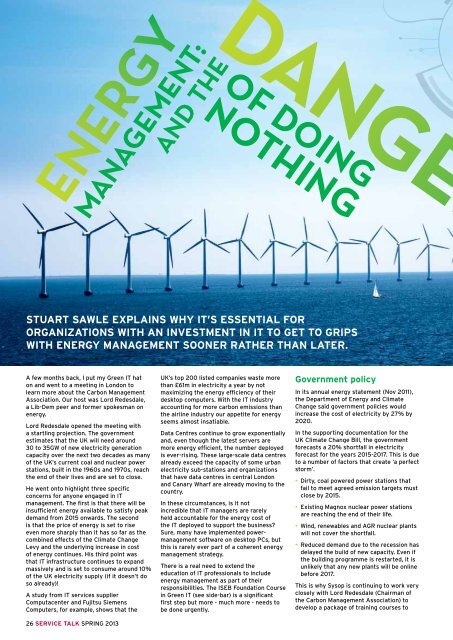SerVICe management - UKCMG
SerVICe management - UKCMG
SerVICe management - UKCMG
Create successful ePaper yourself
Turn your PDF publications into a flip-book with our unique Google optimized e-Paper software.
Energy<br />
MANAGEMENT:<br />
AND THE<br />
DANGER<br />
OF DOING<br />
NOTHING<br />
Stuart Sawle explains why it’s essential for<br />
organizations with an investment in IT to get to grips<br />
with energy <strong>management</strong> sooner rather than later.<br />
A few months back, I put my Green IT hat<br />
on and went to a meeting in London to<br />
learn more about the Carbon Management<br />
Association. Our host was Lord Redesdale,<br />
a Lib-Dem peer and former spokesman on<br />
energy.<br />
Lord Redesdale opened the meeting with<br />
a startling projection. The government<br />
estimates that the UK will need around<br />
30 to 35GW of new electricity generation<br />
capacity over the next two decades as many<br />
of the UK’s current coal and nuclear power<br />
stations, built in the 1960s and 1970s, reach<br />
the end of their lives and are set to close.<br />
He went onto highlight three specific<br />
concerns for anyone engaged in IT<br />
<strong>management</strong>. The first is that there will be<br />
insufficient energy available to satisfy peak<br />
demand from 2015 onwards. The second<br />
is that the price of energy is set to rise<br />
even more sharply than it has so far as the<br />
combined effects of the Climate Change<br />
Levy and the underlying increase in cost<br />
of energy continues. His third point was<br />
that IT infrastructure continues to expand<br />
massively and is set to consume around 10%<br />
of the UK electricity supply (if it doesn’t do<br />
so already)!<br />
A study from IT services supplier<br />
Computacenter and Fujitsu Siemens<br />
Computers, for example, shows that the<br />
26 SERVICE TALK SPRING 2013<br />
UK’s top 200 listed companies waste more<br />
than £61m in electricity a year by not<br />
maximizing the energy efficiency of their<br />
desktop computers. With the IT industry<br />
accounting for more carbon emissions than<br />
the airline industry our appetite for energy<br />
seems almost insatiable.<br />
Data Centres continue to grow exponentially<br />
and, even though the latest servers are<br />
more energy efficient, the number deployed<br />
is ever-rising. These large-scale data centres<br />
already exceed the capacity of some urban<br />
electricity sub-stations and organizations<br />
that have data centres in central London<br />
and Canary Wharf are already moving to the<br />
country.<br />
In these circumstances, is it not<br />
incredible that IT managers are rarely<br />
held accountable for the energy cost of<br />
the IT deployed to support the business?<br />
Sure, many have implemented power<strong>management</strong><br />
software on desktop PCs, but<br />
this is rarely ever part of a coherent energy<br />
<strong>management</strong> strategy.<br />
There is a real need to extend the<br />
education of IT professionals to include<br />
energy <strong>management</strong> as part of their<br />
responsibilities. The ISEB Foundation Course<br />
in Green IT (see side-bar) is a significant<br />
first step but more - much more - needs to<br />
be done urgently.<br />
Government policy<br />
In its annual energy statement (Nov 2011),<br />
the Department of Energy and Climate<br />
Change said government policies would<br />
increase the cost of electricity by 27% by<br />
2020.<br />
In the supporting documentation for the<br />
UK Climate Change Bill, the government<br />
forecasts a 20% shortfall in electricity<br />
forecast for the years 2015-2017. This is due<br />
to a number of factors that create ‘a perfect<br />
storm’.<br />
• Dirty, coal powered power stations that<br />
fail to meet agreed emission targets must<br />
close by 2015.<br />
• Existing Magnox nuclear power stations<br />
are reaching the end of their life.<br />
• Wind, renewables and AGR nuclear plants<br />
will not cover the shortfall.<br />
• Reduced demand due to the recession has<br />
delayed the build of new capacity. Even if<br />
the building programme is restarted, it is<br />
unlikely that any new plants will be online<br />
before 2017.<br />
This is why Sysop is continuing to work very<br />
closely with Lord Redesdale (Chairman of<br />
the Carbon Management Association) to<br />
develop a package of training courses to




